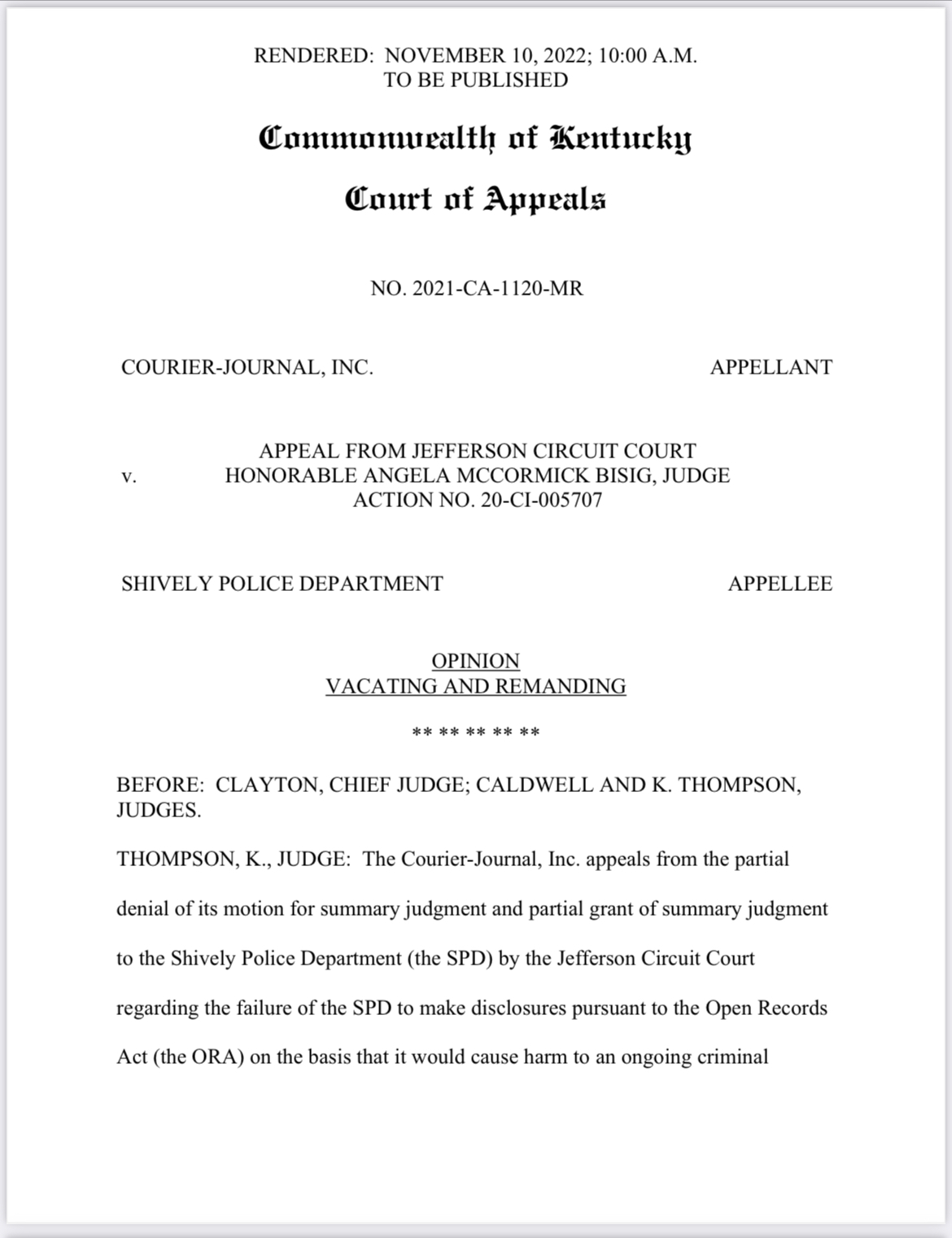
The Court of Appeals has spoken and the message is clear to law enforcement agencies that deny access to all public records in an open investigation.
No more.
Not under the open records law enforcement exception found at KRS 61.878(1)(h) and not under a separate statute found at KRS 17.150(2).
https://law.justia.com/codes/kentucky/2013/chapter-61/section-61.878/
https://law.justia.com/codes/kentucky/2015/chapter-17/section-17.150
In Courier Journal, Inc. v Shively Police Department — an opinion issued on November 10 — a unanimous court declared:
“[G]eneral allegations of potential harm which would seem to apply in any criminal investigation” are not sufficient to justify wholesale denial of an open records request for records relating to an open investigation.
http://opinions.kycourts.net/COA/2021-CA-001120.PDF
The case began in 2020 when The Courier Journal sued the Shively Police Department for failing to provide records relating to a high speed chase that ended in the deaths of a woman, her son, and a baby, and whether officers complied with department policies on pursuits.
https://www.courier-journal.com/story/news/crime/2020/10/07/shively-pol…
Yesterday, the Court of Appeals’ rejected Shively’s claim that the entire investigative file is exempt from public inspection under KRS 61.878(1)(h), KRS 61.878(1)(a), and KRS 17.150(2). It is the court’s repudiation of Shively’s argument that KRS 17.150(2) authorized blanket denial of the Courier’s request that is singularly important.
In City of Fort Thomas v Cincinnati Enquirer — a 2013 Kentucky Supreme Court opinion — the state’s highest Court determined:
“[T]he law enforcement exemption [KRS 61.878(1)(h)] is appropriately invoked only when the agency can articulate a factual basis for applying it, only, that is, when, because of the record's content, its release poses a concrete risk of harm to the agency in the prospective action. A concrete risk, by definition, must be something more than a hypothetical or speculative concern.”
https://caselaw.findlaw.com/ky-supreme-court/1643297.html
Law enforcement agencies subsequently avoided the limitations the Supreme Court placed on their invocation of KRS 61.878(1)(h) in City of Fort Thomas by citing a separate statute, KRS 17.150(2), to issue wholesale denials of requests for public records in an open investigation.
Over the vehement objections of OAG career staff, attorneys general past and present permitted this, affirming law enforcement agencies’ reliance on KRS 17.150(2) and treating it as an exception to the open records law that applied any time the agencies could not, or did not bother to, show actual, concrete harm from disclosure of a record or records in an open investigation under KRS 61.878(1)(h).
Yesterday’s opinion is the last nail in the coffin of this moribund argument. It forcefully repudiates law enforcement efforts to indefinitely postpone public access to records in open investigations where disclosure of those records would not “harm the agency in the prospective action.”
Thus, Courier Journal v Shively Police Department reaffirms the Supreme Court’s holding in City of Fort Thomas but takes an additional — and critical — step beyond by rejecting KRS 17.150(2) as a default position for law enforcement agencies determined, for whatever reason, to withhold all records in an open investigation regardless of the existence of any harm.
The court expressly rejects past and present attorneys general’s broad application of the statute “to restrict all access to information which law enforcement has which may pertain to a prospective law enforcement action,” observing that “such opinions are not controlling, and we disagree with such an interpretation based on the statutory language. Instead, given the paucity of relevant and applicable controlling authority interpreting KRS 17.150(2), we decide this issue in accordance with our own interpretation of its relevant statutory language.”
(For what it’s worth, OAG career staff regularly “disagreed” with political appointees — hellbent on securing the Attorney General’s “tough on crime” reputation as Kentucky’s chief law enforcement officer — and their “broad application” of KRS 17.150(2) to all records in an open investigation.)
The Court of Appeals repudiates Shively’s reliance on KRS 17.150(2) to “essentially swallow[ ] up the limitations contained in the KRS 61.878(1)(h) exemption.”
“KRS 17.150(2) provides for the complete disclosure of intelligence and investigative reports maintained by criminal justice agencies after prosecution is complete, subject to four specific exemptions. Therefore, KRS 17.150(2) should only apply if the conditions set out in its prefatory language are met. There is no reaching the exceptions where a determination to prosecute has been made and the prosecution is not yet completed.”
Simply put, KRS 17.150(2) is a disclosure statute, with exceptions, that applies after prosecution is complete. It is not a nondisclosure statute and does not apply while the investigation/enforcement action is ongoing.
KRS 17.150(2) is, for all intents and purposes, dead as a basis for denying a request for records in an open investigation.
And the two statutes — long irreconcilable — are at last reconciled.
The court has remanded the case to the Jefferson Circuit Court on several proof issues and the appropriateness of an award of fees and costs. Shively Police Department may seek post-judgment relief or petition the Supreme Court for discretionary review. But the outcome here is a welcomed one that the Kentucky Open Government Coalition fervently hopes will withstand any subsequent challenge.



